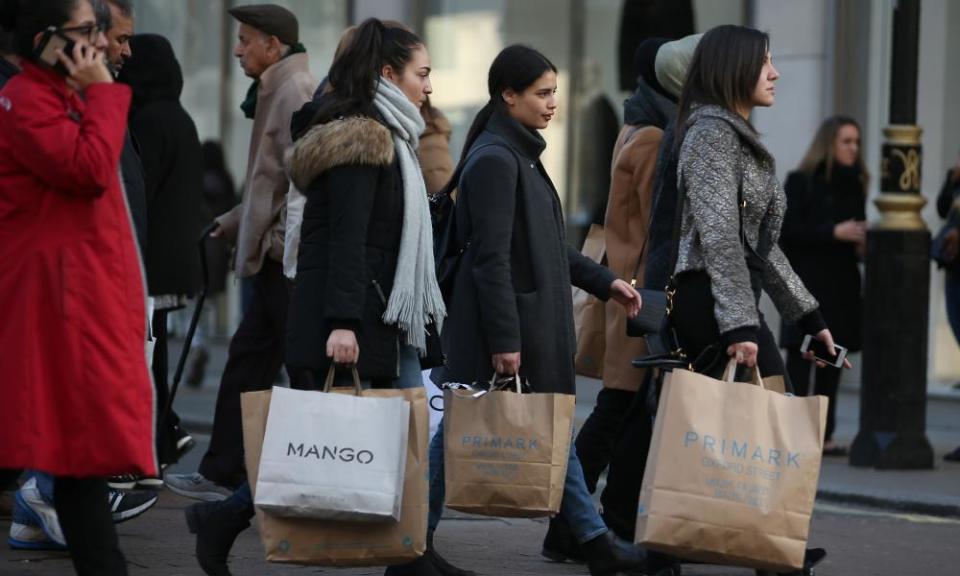Surprise surge in UK retail sales powers pound to eight-month high

A surprise surge in retail sales in April helped push the pound to its highest level in eight months as Britain’s consumers shrugged off concerns over falling living standards.
Warm weather and the Easter holidays encouraged shoppers back onto UK high streets, with retail sales up 2.3% over the month according to the Office for National Statistics. It was more than double the 1% rise forecast by economists, and the biggest monthly rise since January 2016.
April’s rise was a significant rebound compared with March, when sales fell 1.4%, easing fears of an imminent consumer slowdown and signalling a decent start to the third quarter.
The stronger-than-expected figures were at odds with broader expectations of a slowdown in consumer spending this year, as prices begin to outpace wage growth, putting increasing pressure on household budgets.
Falling real pay is already a reality for UK workers, with average earnings rising by 2.1% year on year in the three months to March – slower than the 2.3% rate of inflation in the same period.
“The latest data showed shoppers continued to shrug off any Brexit and political uncertainty with retail sales beating even the most optimistic expectations,” said Richard Lim, chief executive of the consultancy Retail Economics.
“Despite the surge in inflation and squeeze on households’ finances, consumers were out in force during the Easter break with the warm weather driving sales across the sector.”
The UK has relied heavily on consumers to drive growth since the financial crisis, with other sectors of the economy, such as manufacturing and construction taking a bigger hit.
However, with inflation expected to pick up to about 3% and pay growth expected to remain weak, household budgets are likely to come under increasing pressure.
Alan Clarke, an economist at Scotiabank, said that despite the strong retail figures in April, he expected the consumer slowdown to materialise in the coming months, which in turn would weigh on the wider economy.
“With inflation likely to continue accelerating sharply, the headwinds facing the consumer will intensify, which in turn is likely to slow the pace of consumer spending later in the year. We therefore remain of the view that the pace of GDP growth has further downside into the end of the year.”
The rise in April was fairly broad based, with sales in non-food stores up by 2.3% and sales at supermarkets and other food stores up by 1.3%. However, department store sales were down by 0.9%.
The April jump helped retail sales over a broader three-month period grow by 0.3%. This followed a brief period of contraction. The annual rate of growth doubled to 4% from 2% in March.
The stronger-than-expected figures pushed the pound as high as $1.3045 at one point on Thursday – its highest against the dollar since 29 September last year – partly as traders brought forward their expectations for an interest rate rise from the Bank of England. The pound has fallen sharply since the Brexit vote last June, and at $1.30 it is still 13% lower against the dollar than it was on the day of the referendum.
Sterling’s strength on Thursday was also a story of dollar weakness, as US investors grew increasingly nervous about the controversy surrounding President Trump and his firing of FBI director James Comey.
Investor jitters spread to European stock markets, with most major indices closing down. In the UK, the FTSE 100 closed down 0.9% at 7,436, while Germany’s DAX and France’s CAC were down 0.3% and 0.5% respectively.
In the US, markets were slightly higher after suffering their biggest one-day fall since September on Wednesday.
“European equities are now fully entangled in the Trump-related sell-off. On Wednesday the US market bore the brunt of the move but now it has gone global,” said David Madden, market analyst at CMC Markets UK.
“The gains that were made at the beginning of the month are quickly evaporating, and dealers are looking to dump their stocks. Trump has been close to controversy for some time now, but a story like this will hang around, and that is precisely the reason why traders want to exit the market.”

 Yahoo Finance
Yahoo Finance 